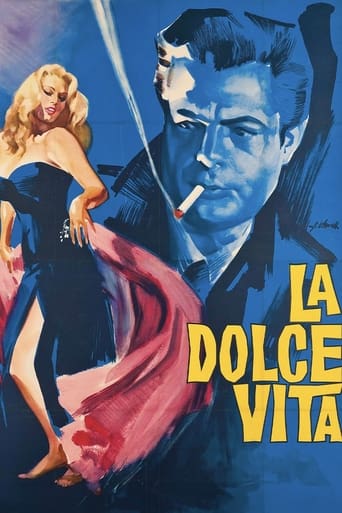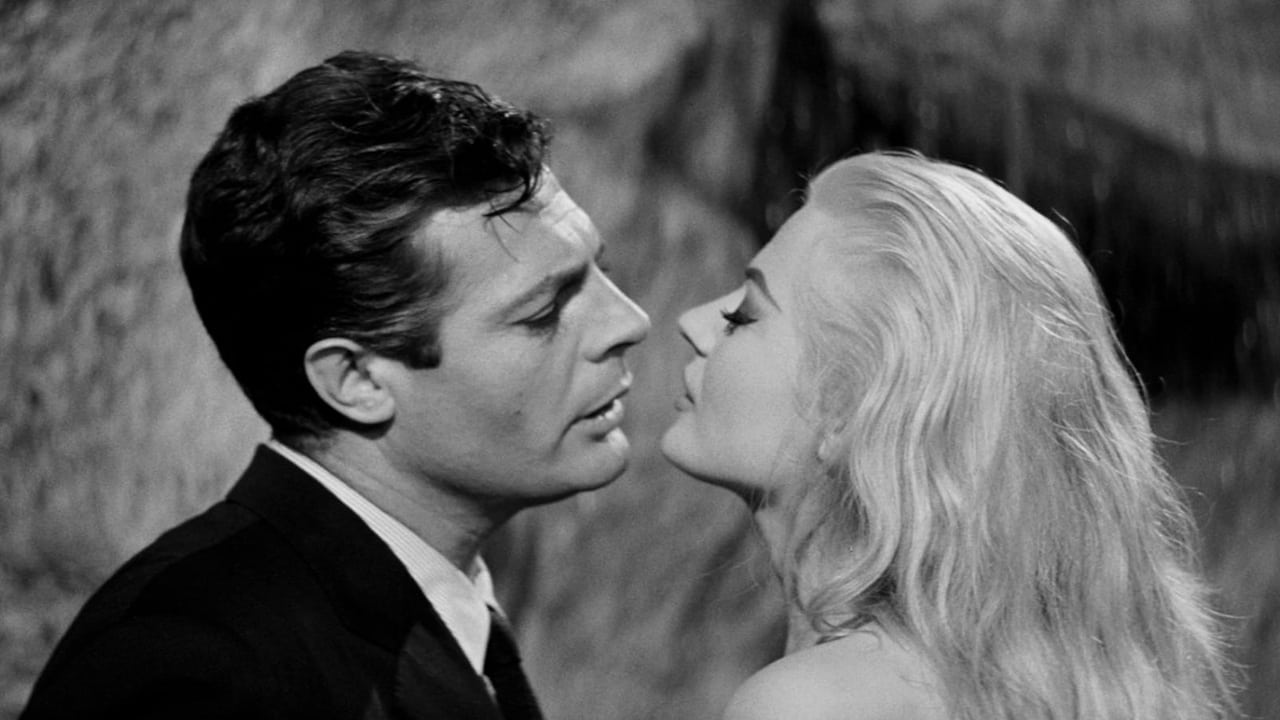christopher-underwood
Generally, I have become more and more certain that 90 minutes is the most reasonable length for any film. So, here we are contemplating watching the famous Fellini epic and so entranced have I been with recent Blu ray viewings of Il Bidoni and La Strada, I take my eye off the ball and forget this runs almost three hours. Of course, it turns out not to matter a joy for it is a joy to watch from start to finish. The camera work and direction are perfect and every scene looks wonderful. Some of the dialogue seems a little arch today, did people really talk like that? Perhaps yes, clearly there were a lot of intellectuals or at least pseudo intellectuals about. Everything unfolds seemingly without effort and in a seeming natural way. We swing from church to whores and literature to night club with the odd something to eat and rather a lot to drink thrown in. Strange times in Italy are being alluded to here and to what extent it was the freedom afforded by the end of the war and a certain flow of money or whatever it is certain that the scandal over the discovery of the body of young Wilma Montesi on the beach and talk of sex and drugs in high places fuelled this little fire. Whether Fellini's invention of the word, paparazzi originated from the Italian word for sparrow or mosquito, the intention is clear and remarkable but then almost everything in this film is. In conclusion I must mention Anita Ekberg and confirm that my screen really did sparkle and shine throughout the period she was there and such was her presence, thanks to lighting, framing and her own seeming 'love of life, that her afterglow prevented the film seeming in any way to lapse into ordinariness once she was gone. Fabulous film and true example of pure cinema. Indeed, I understand there was not even a script.
Vonia
La Dolce Vita (1960) Glitz, glamour. Alakazam. A gorgeous opening scene; a helicopter flying over Italy with a statue of Christ. A great vantage overlooking the Vatican from St Peter's dome. A heavenly escape to Italy's Trevi Fountain. Nightclubs, parties, beaches, forests. A religious retreat that ends in tragedy. A lavish soirée in a stately abandoned castle. A sudden turn to the serious with Steiner's murder of his children and suicide. More drinking. More partying. More socializing. Celebrities, models, prostitutes, and the best thing that came from this film- the word paparazzi (named after Marcello's most disrespectful, vexing photographer friend, Paparazzo). Favorite scene is not the obvious opening one, nor the night that Sylvia, followed by Marcello, wade through the Trevi Fountain. It was the trumpet player and his floating follower balloons at the Cha-Cha. Alright. Followed very closely by Maddalena's coquettish marriage proposal. I mean, it was via an echo chamber in a castle that could have been an art museum. How much more romantic can we get? (That is, until Fellini popped that bubble for us, with another man appearing out of nowhere to kiss her) Favorite character was Steiner. Erudite, insightful, sensitive, and real. Of course, in some of the most emotionally captivating shots, we see the tragic results of his suicide as he sits, bloody and forlorn, hunched over in his living room. Of course, geniuses are often the most unfortunate with mental afflictions. Some of his wisdom: "Don't be like me. Salvation doesn't lie within four walls. I'm too serious to be a dilettante and too much a dabbler to be a professional. Even the most miserable life is better than a sheltered existence in an organized society where everything is calculated and perfected." "Sometimes at night the darkness and silence weigh upon me. Peace frightens me; perhaps I fear it most of all. I feel it is only a facade. I think, 'What is in store for my children tomorrow?' 'The world will be wonderful', they say. But from whose viewpoint? When one phone call could announce the end of everything? We need to live in a state of suspended animation like a work of art, in a state of enchantment. We have to succeed in loving so greatly that we live outside time, detached." Marcello is not a very likable man, and most of the characters are not only pretentious but fake. That is what is at the heart of this film, after all. An examination of the lengths we all go to present ourselves in a positive light to others. As a psychological character study, this film has its strengths. A lot going on. Supposedly, we have seven episodes, representing seven deadly sins, seven sacraments, seven virtues, seven days of creation. The seven principal episodes are as follows (via Wikipedia): 1. Marcello's evening with the heiress Maddalena (Anouk Aimée) 2. His long, frustrating night with the American actress Sylvia (Anita Ekberg) that ends in the Trevi fountain at dawn 3. His reunion with the intellectual Steiner (Alain Cuny); their relationship is divided into three sequences spread over the entire film: a) the encounter, b) Steiner's party, and c) Steiner's tragedy, 4. The fake miracle, 5. His father's visit/Steiner's Party 6. The aristocrat's party/Steiner's tragedy, 7. The "orgy" at the beach. Some liked the episodic structure; I found it made for a very confusing, formless storytelling. It is telling that the best parts of the film are also when the least is going on. His moments with Steiner, when Marcello becomes honest with himself and his friend, examining where he is in life and how he truly feels about it; and then when he is forced to at least momentarily cease the partying and women to face the facts of his unexpected murder suicide. The other scenes where this film is at its best are those between Marcello and his father. We are saddened to see his discouragement at the distance between father and son, cheer to witness them reconnect for the night, and despair ourselves as we watch despair surface on his face as his father rides away into the night, seemingly abandoning him on the dark, empty street. During an interview, Sylvia says, "I like lots of things. But there are three things I like most. Love, love and love." That reflects this film well. An excessive film about excess. Many great scenes. Many not so great scenes. The listlessness of the famous. The pettiness of the rich. The ridiculousness of the religious. The iniquities of the everyday man. 3 hours long, 106 characters. Fellini could have had a real winner here, had he only not been so greedy. Ironically, that doubles as the moral of the film from Marcello's perspective. Marcello's character is actually based on Fellini. And we have come full circle. Maybe this is a genius masterpiece after all? #FilmReview
donaldricco
Overall, I did not like this movie very much. Marcello just goes around randomly from here to there, wearing overly dark sunglasses. Lots of this movie didn't make sense to me at all, like the scene where the children see the Madonna and the party scene at Steiner's. But oh my gosh, Anita Ekberg!!! What a fantastically, gorgeous woman! And that scene in Trevi fountain? Holy moly! When she's under the waterfall type fountain? My god that was sexy!Cool fact: The name origin of that horrible profession - the paparazzi - is from this movie! Cool, but not worth another star!
elvircorhodzic
LA DOLCE VITA is a comedy drama, which, in a surreal and grotesque way, shows a tragicomic deterioration of high society in Rome.The main protagonist is a journalist who wants to become a writer. He writes trivial stories about carousing in high society for a tabloid. His job is to attend each party or important event. However, actresses, artists, starlets and easy life are very appealing to the journalist who, in that frenzy, is trying to find a meaning, love and happiness...Mr. Fellini has, through sharp contrasts and contradictions, showed senselessness of life. That apparent freedom, which includes hedonistic behavior, prostitution and promiscuity is actually a vaguely wandering without a purpose. The protagonists have, in a strange way, Alienated themselves from reality. They enjoy the "sweet life", but they do not understand it.Mr. Fellini, in an ironic way, shows, through unusual incidents, all the superficiality of one layer of society. However, he is not making fun of a frustrated, unfulfilled and unhappy group of people. He has actually replaced dignity with sensationalism. It is a sad view of decadence of one man and his environment. Fellini's world is really crazy, no less crazy than ours, but it is empty. An irregular mosaic structure was arranged in a meaningful and sad whole.The protagonists are lost and do not understand each other.Marcello Rubini (Marcello Mastroianni) is simply brilliant as a journalist, who goes through crazy experiences, while examines important questions of life. Emma (Yvonne Furneau) as his fiancée is, perhaps a true hero in this story, regardless of the pretty powerful bourgeois tone in her character. Steiner (Alain Cuny) is an artist, writer, poet and musician. He is everything that Marcello wants to be. However, Steiner was, despite the wonderful family, tired of life.Anita Ekberg as Sylvia is a big movie star. Marcello is, from the first moment, in love with her. She is a singing and dancing lady, who slowly, like a dream at dawn, escapes from him. Walter Santesso as Paparazzo is "it" in the true sense of that word.The logic is definitely a little "moved" in this film. However, the point is crystal clear.


 AD
AD





